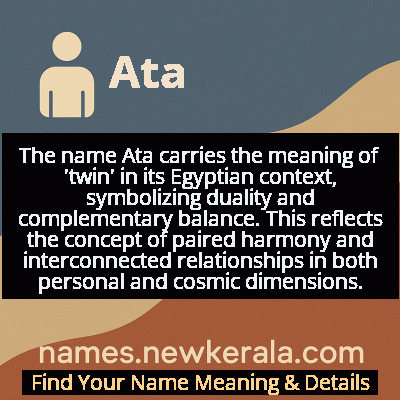Ata Name Meaning & Details
Origin, Popularity, Numerology Analysis & Name Meaning of Ata
Discover the origin, meaning, and cultural significance of the name ATA. Delve into its historical roots and explore the lasting impact it has had on communities and traditions.
Name
Ata
Gender
Male
Origin
Egyptian
Lucky Number
4
Meaning of the Name - Ata
The name Ata carries the meaning of 'twin' in its Egyptian context, symbolizing duality and complementary balance. This reflects the concept of paired harmony and interconnected relationships in both personal and cosmic dimensions.
Ata - Complete Numerology Analysis
Your Numerology Number
Based on Pythagorean Numerology System
Ruling Planet
Uranus (Rahu)
Positive Nature
Strong sense of order, loyal, practical, and disciplined.
Negative Traits
Stubborn, overly serious, rigid, and prone to feeling restricted.
Lucky Colours
Blue, gray.
Lucky Days
Saturday.
Lucky Stones
Blue sapphire.
Harmony Numbers
1, 7, 8.
Best Suited Professions
Managers, engineers, accountants, organizers.
What People Like About You
Dependability, discipline, practicality.
Famous People Named Ata
Ataullah Bogdan Kopański
Military Commander
Polish military officer and commander of Muslim Tatar cavalry units during World War II
Ata Kandó
Photographer
Hungarian-born Dutch photographer known for her humanitarian photography and documentation of refugee crises
Ata Demirer
Comedian and Actor
Popular Turkish comedian, actor, and musician known for his stand-up comedy and film roles
Ataullah Rashidi
Architect
Persian architect during the Mughal Empire who contributed to significant architectural projects in India
Name Variations & International Equivalents
Click on blue names to explore their detailed meanings. Gray names with will be available soon.
Cultural & Historical Significance
Extended Personality Analysis
People named Ata typically exhibit a balanced and harmonious personality, reflecting the twin symbolism through their ability to navigate different perspectives and maintain equilibrium in various situations. They often possess strong leadership qualities tempered with deep respect for tradition and ancestry, making them natural mediators and connectors between different groups or ideas. This balanced nature extends to their cognitive approach, blending analytical reasoning with intuitive insight, which allows them to solve complex problems creatively. Their inherent duality often manifests as remarkable versatility—they can be equally effective in solitary contemplation and social leadership roles. This makes Ata individuals particularly valuable in team environments where they can bridge gaps and foster cooperation. Their thoughtful, reliable nature combined with cultural awareness typically makes them respected members of their communities who value meaningful relationships and cultural continuity.
Modern Usage & Popularity
In contemporary naming practices, Ata maintains consistent usage primarily in Turkish-speaking regions and among global Muslim communities, serving as both a traditional choice and a connection to cultural heritage. The name has experienced renewed interest in Turkey as part of a broader trend toward reviving historically significant names, particularly those honoring Turkish identity and ancestral traditions. Among diaspora communities in Europe, North America, and Australia, Ata functions as a cultural anchor that remains phonetically accessible across different languages. While not ranking among the most popular names globally, it holds steady appeal for families seeking meaningful, culturally rich names that are distinctive without being unfamiliar. The digital age has increased its visibility through social media and global connectivity, though its usage patterns remain more traditional than trendy, appealing particularly to families with strong connections to Turkish or Islamic cultural heritage.
Symbolic & Spiritual Meanings
Symbolically, Ata represents the fundamental concept of duality and complementary balance, embodying the idea that opposing forces can create harmony when properly integrated. This twin symbolism extends to representing the connection between past and future, tradition and innovation, making it a name that speaks to continuity and evolution. In spiritual contexts, Ata often symbolizes the bridge between human and divine, or the balance between worldly responsibilities and spiritual aspirations. The name carries connotations of heritage and legacy, representing the transmission of wisdom, values, and cultural identity across generations. This rich symbolic tapestry makes Ata a name that encompasses both the practical and philosophical dimensions of human existence, serving as a reminder of the interconnectedness of all things and the importance of maintaining balance in one's life and relationships.

